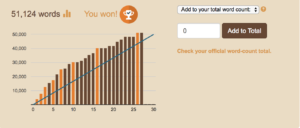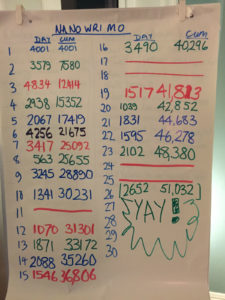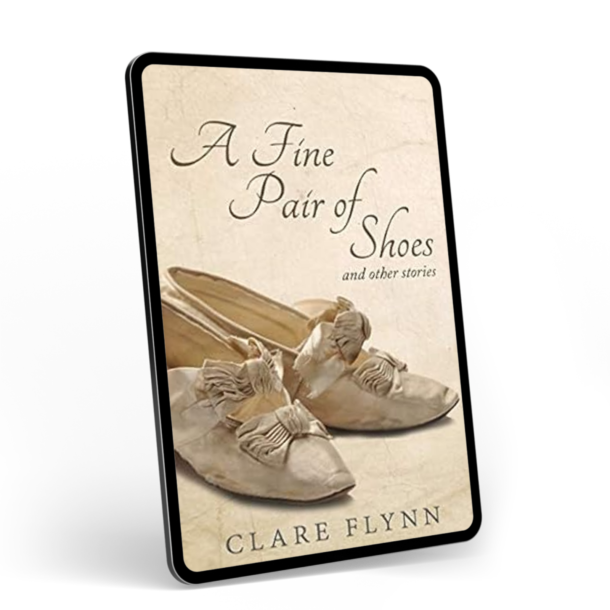Yesterday was a big day – I’ve completed my third NaNoWriMo in a row, with four days to spare. In case you don’t know what NaNoWriMo is – it’s NationalNovelWritingMonth – entrants are targeted with writing fifty thousand words during the month of November –an average of 1667 words per day.
NaNoWriMo has been going for nineteen years now. The word ‘National’ is now a misnomer as there are hundreds of thousands of participants from all across the world, 400,00 at the last count, having grown from around a dozen people in San Francisco. I suppose when the eleven founders began they thought the word National was an aspiration and now it’s a massive understatement.
Having got three and a bit novels out of NaNoWriMo so far, I thought I’d share the secrets of my success – my personal top tips.
Don’t expect to write a whole novel in the month.
The rules are loose – you just have to get the words in. But I think it’s cheating to make up the total with blog pieces – but fair game to use your 50k word count to finish a book you’ve already started. This has been the case with me for the past three years – The Green Ribbons was already started (although it went under the working title of Nettlestock), as was The Chalky Sea last year. But in both cases the central core of the books was constructed during NaNoWriMo. This year I almost didn’t participate as I knew I would be nearing the end of my first draft of The Alien Corn and only needed about ten thousand more words. As I had a germ of an idea for a novella I decided to use the month to finish The Alien Corn and break the back of the novella. So this is the first time I’ve actually started with Chapter One during NaNoWriMo.
Get off to a fast start
 I try to build a buffer so that I am always ahead of the game on the natty little graphs that show your progress on the NaNoWriMo website. I try to keep the first week of November as clear as possible to allow me maximum time for this. This year I had hit the half way mark at the end of the first week. After that it was Slow Slow Slow! If you fall behind the curve it can be dispiriting and as in my experience it ALWAYS gets harder as the month progresses, you are more likely to fade away and give up. If however you are ahead of the curve you can allow yourself days off when you feel like it – I had five NaNo-free days this time (plus of course the rest of the month!). Then you can rise again refreshed and ready to go.
I try to build a buffer so that I am always ahead of the game on the natty little graphs that show your progress on the NaNoWriMo website. I try to keep the first week of November as clear as possible to allow me maximum time for this. This year I had hit the half way mark at the end of the first week. After that it was Slow Slow Slow! If you fall behind the curve it can be dispiriting and as in my experience it ALWAYS gets harder as the month progresses, you are more likely to fade away and give up. If however you are ahead of the curve you can allow yourself days off when you feel like it – I had five NaNo-free days this time (plus of course the rest of the month!). Then you can rise again refreshed and ready to go.
If (like me) you’re competitive use that to your advantage
 I’m horribly competitive – I was banned from playing Monopoly and Trivia years ago by F&F. I’m also a bit lazy. So NaNoWriMo is a godsend to me as the competitive gene supersedes the lazy one. The NaNoWriMo website has a buddy page where you can link up with other authors – their word counts are displayed every day so that can be an impetus to get moving. This year I decided I would compete with myself. I set up a flip chart and recorded my daily progress, so it was there as a constant reminder and spur to action. Yes, I know I’m pathetic – but it works for me!
I’m horribly competitive – I was banned from playing Monopoly and Trivia years ago by F&F. I’m also a bit lazy. So NaNoWriMo is a godsend to me as the competitive gene supersedes the lazy one. The NaNoWriMo website has a buddy page where you can link up with other authors – their word counts are displayed every day so that can be an impetus to get moving. This year I decided I would compete with myself. I set up a flip chart and recorded my daily progress, so it was there as a constant reminder and spur to action. Yes, I know I’m pathetic – but it works for me!
Don’t worry if you don’t manage to “win”
If you are a slow writer and shrink from the idea of 50k, if you only manage to get 25k or 15k or 2k or even just five hundred words – but those are words that you wouldn’t have got done otherwise then you are a Winner, regardless of not breaking through the 50k in 30 tape. NaNoWriMo has been the catalyst to many people starting to write. The beauty of it is the idea of dedicating a month where writing is at the top of your personal agenda.
Making your book real
 A lovely feature of the NaNoWriMo website is the ability to upload a cover for your book. I always use a professional cover designer (mine is Jane Dixon-Smith) but for NaNoWriMo I make my own “work in progress” cover as well as a working title. There is no way on earth it will ever be used in the final book, but it helps to make the idea of that book real and concrete.
A lovely feature of the NaNoWriMo website is the ability to upload a cover for your book. I always use a professional cover designer (mine is Jane Dixon-Smith) but for NaNoWriMo I make my own “work in progress” cover as well as a working title. There is no way on earth it will ever be used in the final book, but it helps to make the idea of that book real and concrete.
Making it real helps you believe in it. As writers we deal in words and so making a cover with a title (even a temporary one) can help anchor the idea of your new book in reality. It’s particularly important for new unpublished writers who may lack self-belief. This is not about sharing with others – it’s about making it real for YOU! It’s your mark in the sand, your flag at the top of the mast.
But you say… writing is a slow and contemplative process – not a race to get words on the page.
Who says? There are so many myths and sacred cows about writing and assumptions that something done quickly is done badly. I would contest that. Now there’s no way I could sustain the NaNoWriMo level of productivity all year round (although some do) – but I find that I often write much better during November. Firstly it is a total immersion. I live, sleep, and breathe my book. I dream about it. I agonise over it and I am deeply involved in it in a way that I’m not the rest of the year. At my usual slower pace I occasionally have a run of days (holidays for example) when I’m not writing at all and lose the thread – the magic golden chain of my story. I find myself writing things and then discover I’m repeating myself. What you’re not trying to do is get a finished polished draft out of NaNoWriMo. The aim is to get words on the page – to be honed, massaged and perfected later.
The benefit of momentum
One of the critical success factors to creativity is getting a sense of momentum behind your ideas. Speed is an increasingly valuable commodity yet there is still a sense of distaste about it in the creative world. People who turn their noses up at writing fast are often “busy” but without being productive. Moving slowly also allows self doubt to creep in. Blasting through that and getting your ideas on the page can make a huge difference. Banish the Editing self, the Critical self (give them full rein later), and tap into the Creative self. Apart from generating a huge tidal wave of momentum, you are also tapping into your subconscious mind – something highly creative people have always been able to do. Anyone who has ever practised Free Writing knows this. Also those who follow the approaches of Julia Cameron’s The Artists’s Way (and Dorothea Brande before her) will understand the power of writing fast, freely and furiously each morning. So forget the cynics and naysayers and give it a go.
Whether you get a whole novel or a small part of one matters not, if you throw yourself into this for just one month in the year you’ll reap the benefits.


0 Comments